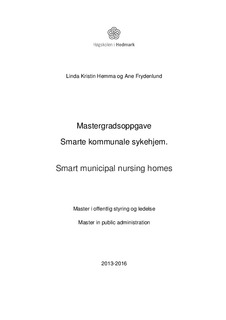Smarte kommunale sykehjem
Master thesis
Permanent lenke
http://hdl.handle.net/11250/2381104Utgivelsesdato
2016Metadata
Vis full innførselSamlinger
Sammendrag
Som bakgrunn og tema for denne masteroppgaven, ligger regjeringens plan for omsorgsfeltet
2015–2020. Den omfatter prioriterte områder i regjeringsplattformen, med viktige tiltak for å
styrke kvaliteten og kompetansen i omsorgs-tjenestene. Det skal legges til rette for en
langsiktig omstillingsprosess som kan sikre nyskaping og utvikling av nye og forbedrede
løsninger i omsorgssektoren. Forenkling, fornyelse og forbedring av offentlig sektor er ett av
regjeringens hovedsatsingsområder. En forutsetning for fornyelse og innovasjon i
omsorgssektoren er kommunal handlefrihet til å utvikle fag, ledelse, ny teknologi og nye
organisasjonsformer. Som ledere i kommunal virksomhet er vi opptatt av forbedring av
struktur, systemer, måloppnåelse, resultater og ledelse som hovedmålsettingen for vårt
arbeid. Dette ønsker vi å få til ved å utvikle menneskelige ressurser, styrke læring i
organisasjonen slik at ansatte blitt mer fremtredende og ansvarliggjort, samt ha systemer og
struktur som kvalitet og kontrollindikatorer. Vi her derfor foretatt analyser blant ansatte på
kommunale sykehjem og beskrevet utfordringer sykehjem står overfor.
Det er en teoretisk oppgave som tar utgangspunkt i forskning som omhandler kvalitet i
sykehjem og tar for seg rolleforventninger, transformasjonsledelse og relasjonsledelse, mål
og målstyring, mestring og organisasjonstilhørighet. Det teoretiske stoffet hentes både fra
aktuelle offentlige meldinger, utredninger og lovverk. Litteratur innenfor organisasjon og
ledelse er sentral samt aktuell teori innenfor ulike helsefag og samfunnsfag.
Problemstillingen for oppgaven er: «Hvilken betydning har rolleforventninger for ansattes
opplevelse av mestring og jobbkrav i kommunale sykehjem?»
Rolleforventninger, ledelse og mestring er sentral i drøftingsdelen og der kommer frem
områder krav og forventinger ikke harmoniserer i dagens sykehjem.
Videre blir det pekt på hvilken betydning mål og målstyring har i sykehjem. Hvilken
betydning relasjonsledelse og transformasjonsledelse har i sykehjem, og hvordan fokus på
stress, mestring og organisasjonstilhørighet kan være en hjelp for å sikre kvalitet og
måloppnåelse drøftes også.
Kort oppsummert vil det si at rolleforventninger er av betydning for ansattes opplevelse av
jobbkrav og mestring. Roller må være avklart og avstemt med leder og kollegaer. Ledelse blir en avgjørende faktor, med relasjonsledelse som innfallsvinkler. Målet med dette er at de
ansatte blir sett og hele organisasjonen er et lag. Dette vil kunne engasjere ledere og ansatte
til å innfri i større grad enn forventet, som er i tråd med momentene i transformasjonsledelse.
Læringskrav og kvantitative krav er scoret lavt, som skyldes i stor grad rolleuklarheter
vedrørende mål og ansvarsforhold. Det rapporteres om høye beslutningskrav som innebærer
at det er behov for å endre lederstilen til for eksempel relasjonsledelse slik at de ansatte kan
få støtte til å ta vanskelige avgjørelser. Mestringsfølelse, positivt stress og tilbakemeldinger
vil være områder som må ha fokus for å lykkes i virksomheten. Dette er med på å skape vifølelse
og organisasjonstilhørighet The background and theme for this thesis, is the government's healthcare plan from 2015 to
2020. It includes key measures to strengthen the quality and competence of care services. It
is intended as a long-term restructuring process ensuring innovation and development of new
and improved solutions in life sciences. Simplification, renovation and improvement of the
public sector is one of government's main focus areas. A prerequisite for renewal and
innovation in care is a municipal agency to develop sciences, management, new technologies
and new forms of organization. As leaders in civic activities, the main objectives of our work
are concerned with the improvement of structure, systems, effectiveness, performance and
leadership. By developing human resources and putting systems and structure for quality
control, we want to enhance learning in the organization so that employees become more
prominent and accountable. To identify the challenges faced in healthcare we have
conducted analyzes amongst employees in municipal nursing homes.
There is research based theory dealing with the quality of nursing and examining the
expectations of different nursing and management roles, as well as transformational
leadership and relationship management, goal and performance management, coping and
organizational affiliation. The theoretical material is obtained from the relevant public
messages, reports and legislation. Literature in organization and management along with
relevant theory in various health and social sciences are central to our thinking.
The problem for the thesis is: "What effect does the structure of roles and responsibilities
have on the employees' mastery, success and job satisfaction in a council nursing home?"
Role Expectations, leadership and mastery are central to the deliberation and the issue of the
gap between the expectations and actual working experiences in today's nursing homes
emerges.
Furthermore, it pointed out the importance of goals and performance management in nursing
homes. The significance of relationship management and transformational leadership in
nursing homes, and how the focus on stress, coping and organizational affiliation can help to
ensure quality and performance are also discussed.
The paper concludes that role expectations are of importance to employees' perception of job demands and coping. Roles must be clarified and reconciled with management and
colleagues. Management becomes a decisive factor, with relation management as an
approach. The aim is for employees to be seen and the entire organisation to work together
as a team. This will engage managers and employees to perform at a higher standard than
expected, which is one of the elements regarding transformational leadership. When learning
requirements and quantitative requirements are not fulfilled, this is largely due to role
ambiguities concerning goals and responsibilities. There are reports of requirements of high
resolution, which means that there is a need to change leadership style to such as relationship
management, so that employees can get support to take difficult decisions. Coping
Sensation, positive stress and feedback will be areas of focus in order to succeed in business.
This helps to create a sensation of us, and organisational affiliation
Beskrivelse
Erfaringsbasert master 90 poeng

